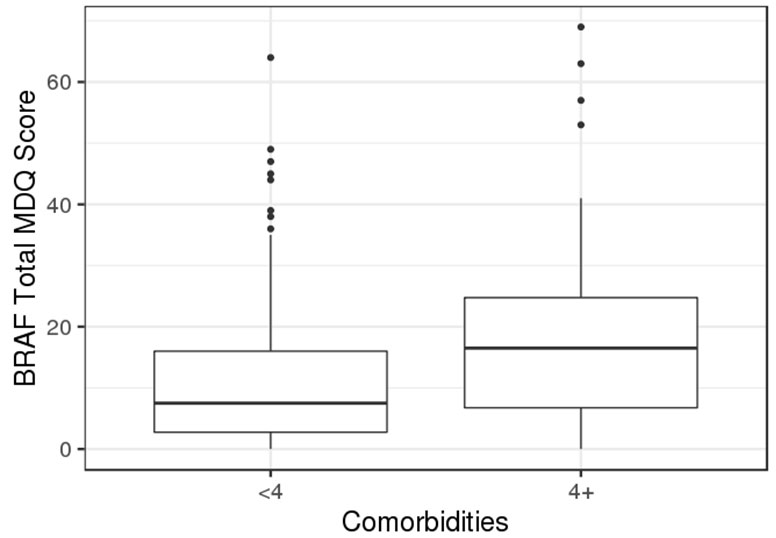Session Information
Date: Tuesday, November 12, 2019
Title: RA – Diagnosis, Manifestations, & Outcomes Poster III: Comorbidities
Session Type: Poster Session (Tuesday)
Session Time: 9:00AM-11:00AM
Background/Purpose: Fatigue is a pervasive problem for many patients with rheumatoid arthritis (RA) that often persists despite treatment with effective disease-modifying therapies. Recent studies have suggested that patients with RA have a high burden of multimorbidity, which could affect their disease experiences and treatment outcomes. We sought to determine whether multimorbidity is associated with fatigue in patients with RA.
Methods: This cross-sectional, prospective study of a population-based cohort from a geographically well-defined area included patients with prevalent RA who completed a questionnaire. Fatigue was assessed using the Bristol Rheumatoid Arthritis Fatigue Multidimensional Questionnaire (BRAF-MDQ, V1 27.08.10). Patients’ medical records were reviewed for 25 chronic comorbidities from a combination of the Charlson Comorbidity Index, Elixhauser Comorbidity Index, and Rheumatic Disease Comorbidity Index prior to the date of BRAF-MDQ. Rheumatic comorbidities were not included. Linear regression models were used to estimate the change in fatigue outcome with multimorbidity adjusting for age, duration of RA, sex, obesity (body mass index ≥30 kg/m2), current smoking status, C-reactive protein and RF/CCP positivity. Models were fit for the Total MDQ score and each subscore.
Results: The cohort included 192 patients (median age: 62 years, median RA duration: 13 years, 75% female, 46% obese, 6% current smokers, 69% RF/CCP positive). Multimorbidity was common with 93 (48%) patients having 2 or more comorbidities, and 27 (14%) having 4 or more comorbidities. Total BRAF-MDQ scores ranged from 0-69 (median [interquartile range (IQR)] 9 [3, 18]), with higher scores indicating greater fatigue. Patients with 4 or more comorbidities had higher total BRAF-MDQ scores (mean: 21.2; SD 20.2) than patients with less than 4 comorbidities (mean 11.2; SD 11.6; p=0.014; figure) Adjusted linear regression models revealed each additional comorbidity was associated with a 2.4 unit (95% confidence interval [CI]:1.0-3.7) increase in total BRAF-MDQ level (p< 0.001), and the presence of 4 or more comorbidities was associated with an 10.1 (95% CI: 4.3-15.9) unit increase in total BRAF score. Comorbidities were significantly associated with all 4 subscores in adjusted models. An association of this magnitude is likely to be clinically meaningful.
Conclusion: High levels of multimorbidity are associated with increased fatigue in patients with RA. The findings suggest that interventions targeting multimorbidity could help alleviate treatment-refractory fatigue in patients with RA and other rheumatic diseases.
To cite this abstract in AMA style:
Davis J, Myasoedova E, Gunderson T, Crowson C. Multimorbidity May Worsen Fatigue in Patients with Rheumatoid Arthritis [abstract]. Arthritis Rheumatol. 2019; 71 (suppl 10). https://acrabstracts.org/abstract/multimorbidity-may-worsen-fatigue-in-patients-with-rheumatoid-arthritis/. Accessed .« Back to 2019 ACR/ARP Annual Meeting
ACR Meeting Abstracts - https://acrabstracts.org/abstract/multimorbidity-may-worsen-fatigue-in-patients-with-rheumatoid-arthritis/

